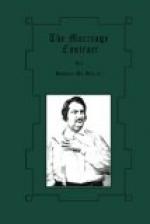“It is a year to-day, Josette, since I received my dear wife’s last sigh; I little knew then that I should stand here again to see the count half dead.”
“Poor man! he moans in his sleep,” said Josette.
“Sac a papier!” cried the old notary, an innocent oath which was a sign with him of the despair on a man of business before insurmountable difficulties. “At any rate,” he thought, “I have saved the title to the Lanstrac estate for him, and that of Ausac, Saint-Froult, and his house, though the usufruct has gone.” Mathias counted his fingers. “Five years! Just five years this month, since his old aunt, now dead, that excellent Madame de Maulincour, asked for the hand of that little crocodile of a woman, who has finally ruined him—as I expected.”
And the gouty old gentleman, leaning on his cane, went to walk in the little garden till his guest should awake. At nine o’clock supper was served, for Mathias took supper. The old man was not a little astonished, when Paul joined him, to see that his old client’s brow was calm and his face serene, though noticeably changed. If at the age of thirty-three the Comte de Manerville seemed to be a man of forty, that change in his appearance was due solely to mental shocks; physically, he was well. He clasped the old man’s hand affectionately, and forced him not to rise, saying:—
“Dear, kind Maitre Mathias, you, too, have had your troubles.”
“Mine were natural troubles, Monsieur le comte; but yours—”
“We will talk of that presently, while we sup.”
“If I had not a son in the magistracy, and a daughter married,” said the good old man, “you would have found in old Mathias, believe me, Monsieur le comte, something better than mere hospitality. Why have you come to Bordeaux at the very moment when posters are on all the walls of the seizure of your farms at Grassol and Guadet, the vineyard of Belle-Rose and the family mansion? I cannot tell you the grief I feel at the sight of those placards,—I, who for forty years nursed that property as if it belonged to me; I, who bought it for your mother when I was only third clerk to Monsieur Chesnau, my predecessor, and wrote the deeds myself in my best round hand; I, who have those titles now in my successor’s office; I, who have known you since you were so high”; and the old man stopped to put his hand near the ground. “Ah! a man must have been a notary for forty-one years and a half to know the sort of grief I feel to see my name exposed before the face of Israel in those announcements of the seizure and sale of the property. When I pass through the streets and see men reading these horrible yellow posters, I am ashamed, as if my own honor and ruin were concerned. Some fools will stand there and read them aloud expressly to draw other fools about them—and what imbecile remarks they make! As if a man were not master of his own property! Your father ran through two fortunes before he made the one he left




